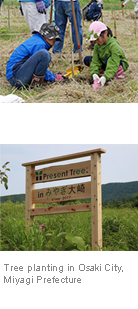Environmental Preservation with External Partners
Kumon Forest Foundation
The Kumon Group has made donations to various environmental organizations in the past, and in 2014 we established the Kumon Forest Foundation to create a system that allows us to continue providing support to organizations engaged in environmental conservation activities.
The Kumon Group uses a great deal of paper for learning materials. For this reason, we have made it one of our most important environmental goals to avoid wasting paper resources, and Kumon staff have been working together to use environmentally friendly paper, to reduce the use of paper other than for learning materials, and to recycle used paper.
In the future, we will strive to reduce our own environmental impact and to promote activities with external partners that protect forest resources through the Kumon Forest Foundation so as to contribute to the conservation of the global environment and the realization of a sustainable society.
Environmental Protection Activities with External Partners
Support for WWF Japan’s Forest Conservation Activities
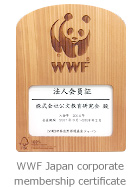
The Kumon Group has been supporting WWF Japan, a member of the WWF Network and a global environmental conservation organization operating in more than 100 countries, through the Kumon Forest Fund since 2014.
WWF was founded in Switzerland in 1961. Its main activities are to protect biodiversity on the earth and to reduce the impact of human life on the natural environment and wildlife. One of these activities is forest conservation.
WWF Japan works toward sustainable forest conservation through direct activities in the field, such as research and conservation of rare species and reforestation, as well as by supporting local communities and responsible raw material procurement in Japan. In addition, we also conduct public awareness activities through the development of environmental education programs and seminars on the environment.
Through its global network, WWF Japan supports forest conservation activities in countries around the world and is also involved in environmental education. The Kumon Group, which aims to contribute to local and global communities through education around the world, continues to support these activities, as we share the same goals.
Awarded the Medal with Dark Blue Ribbon
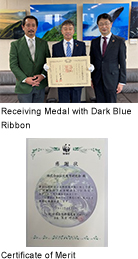
In 2022, WWF Japan was awarded the Medal with Dark Blue Ribbon in recognition of its support activities for forest conservation activities, and on August 17, 2022, a gift presentation ceremony was held at the Ministry of the Environment, where a certificate of merit was awarded. The Medal with Dark Blue Ribbon is awarded to individuals or organizations that have donated private funds for the public good and whose achievements have been outstanding.
The Medal with Dark Blue Ribbon was also awarded in recognition of the company's ESD activities during the pandemic aimed at environmental preservation and creating a society that coexists in harmony with nature in Indonesia.
The Kumon Group will continue to contribute to forest conservation and sustainable education through its support for WWF Japan.
*ESD: Education for Sustainable Development. Activities aimed at creating new values and actions that will lead to solutions to various global problems such as the environment, poverty, human rights, peace, and development, and to the creation of a sustainable society.
Environmental Preservation with External Partners
ESD Activities in Indonesia
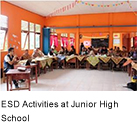
Borneo Island is rich in biodiversity, but its forests are shrinking year by year due to the expansion of plantations by small-scale farmers to grow oil palm (the plant from which palm oil is made).
In order to realize sustainable palm oil production and halt deforestation in Merawi, West Kalimantan, Borneo, it is necessary to raise the environmental awareness of the entire community and build a system to manage the forest.
In order to raise the awareness and interest of as many local residents as possible, ESD was introduced at two junior high schools in the target area. The goal of ESD is to: 1) raise environmental awareness not only among children but also among teachers, staff, and local residents by establishing a system for implementing environmental education, and 2) to create a curriculum that is in line with the characteristics and needs of the region, and to involve more stakeholders in the creation of a sustainable province.
When WWF first began working in Merawi, it was mainly in collaboration with small-scale farmers and the provincial government, but as time has passed, the content and scope of activities have expanded and many stakeholders have become involved in the creation of a sustainable province. Today, the principals of two junior high schools participate in the program, and various groups meet once every three to four months to exchange opinions.
Forest Conservation in Brazil
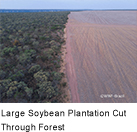
As Brazil continues to experience deforestation due to rapid agricultural and economic development, WWF Japan has initiated forest conservation activities in two important ecosystems in Brazil, the Cerrado and the Atlantic Forest, starting in 2022
The Cerrado, a vast savanna area that runs through the center of Brazil, boasts rich biodiversity, massive carbon storage, and abundant groundwater sources. However, the region's nature is now being lost to cattle grazing and large-scale agricultural development for the cultivation of soybeans and other crops.
WWF supports local residents who collect seeds and cultivate seedlings in areas suitable for regeneration, and together they promote reforestation such as tree planting. Through dialogue with companies involved in soybean distribution, WWF is also working to halt the destruction of forests caused by soybean production.
The Atlantic Forest on Brazil's Atlantic coast is a treasure trove of biodiversity, but as a result of economic development over the past several hundred years, only 12% of the original forest now remains, and many endemic species are threatened with extinction.
WWF, together with other environmental organizations, has set a goal of reforesting 15 million hectares by 2050. Working with local NGOs and local communities, WWF is engaged in reforestation activities that combine the needs of local people and forest conservation, such as balancing reforestation and income through agroforestry (a farming method in which forests and agriculture coexist in harmony) and land rehabilitation that improves water sources.
Participation in Reforestation Activities through the Tree as a Present
All Instructors in Japan submit reports via the Center system and they order worksheets and items via the internet as part of the effort by the Kumon Institute of Education. We have set up a system where Instructors are given “Green Points” in this process. The Green Points that are earned can be donated to the NPO Environmental Relations at a rate of 1 Green Point = 1 yen. This NPO is engaged in tree planting activities called the “Present Tree.”
In fiscal year 2022, a total of 660,000 yen, including 150,000 yen collected from Instructors, was donated for a tree-planting activity in Osaki City, Miyagi Prefecture. The forestation site is located in the Onikobe district of Naruko Onsen, which is closest to the border between Yamagata and Akita prefectures, and is an area that has temporarily halted cattle grazing due to the Fukushima Daiichi nuclear power plant accident. Broadleaf tree saplings were planted to restore the natural forest in the area where the demand for pasture grass has decreased and grass harvesting is no longer carried out. A forest of broadleaf trees was created near the source of the Eai River, located in the Naruko Onsen Gorge, to nurture the water that feeds the rice fields downstream.
- Environmental Management
of the Kumon Group - Environmental Philosophy and Environmental Policy,
and environmental promotion system
Kumon's
Environmental
Activities
- Environmental
Management of
the Kumon Group - 2022 Activities and
Environmental Data - Environmental
Communication - Kumon Environmental Activities Around the World
- Environmental Preservation with External Partners
